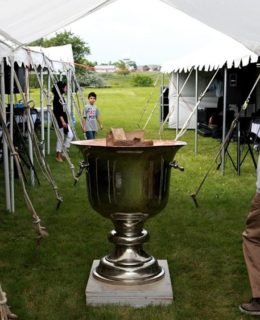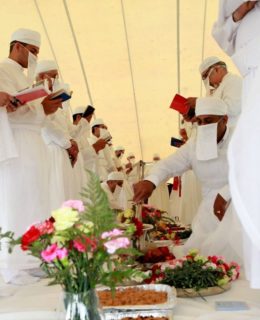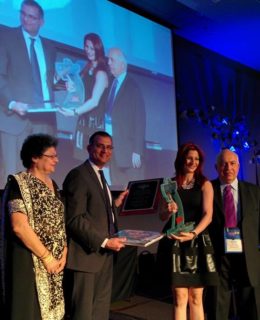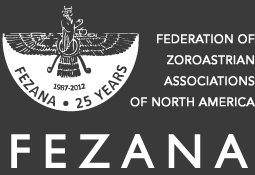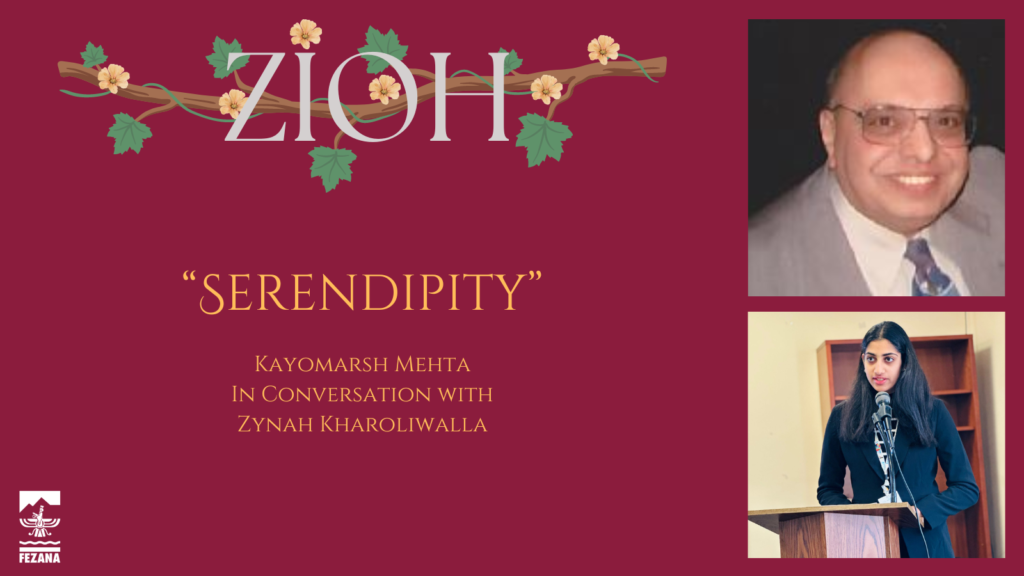
Youth: Zynah Kharoliwalla
Interviewing Kayo uncle was a very enlightening experience. I learned so much about the history of my own community as well as the stories of people who are often undervalued. It made me realize that so many people in our ZAMC Dar-e-Mehr never get a chance to share their stories, and beautiful life tales often go unnoticed. I’m very happy he gave me the opportunity to share his story with the rest of the world.
Participant: Kayomarsh Mehta
The interview with Zynah helped me recall some of the most pleasant incidents of my early days in Chicago. Zynah was very well prepared to ask pertinent questions that jogged my memory of my own migration and of the formation of Zoroastrian Association of Metropolitan Chicago and building of our Dar-e- Meher, the first Dar-e-Meher in North America to be built from the ground up.
SERENDIPITY:
An Interview with Kayomarsh Mehta
Interviewer: Zynah Kharoliwalla
Date: 9/10/2023
Transcript
00:00:00 Interviewer
Hello, my name is Zynah Kharoliwalla. And who am I interviewing today?
00:00:05 Interviewee
My name is Kayomarsh Mehta.
00:00:08 Interviewer
Awesome. Alright, so I’m going to ask you some questions and you can just reply. Alright? So tell me about your childhood where you grew up.
00:00:19 Interviewee
I was born in Navsari and then moved to Bombay, I think around when I was in the 4th grade. We moved with my mother to Ahmedabad, finished my schooling in Ahmedabad and finally after that I went to Baroda for my engineering college and did my engineering degree.
00:00:55 Interviewer
So when you lived in Navsari, did you live in a baug?
00:00:59 Interviewee
No, no, no, sorry. We used to have streets that were called molas and there was a house there, but I only lived in Navsari for a year.
00:01:14 Interviewer
And then when you moved to Mumbai, did you live in a baug?
00:01:17 Interviewee
No, no, we lived in a building that was all parsis. But like the rest of the buildings in the street. We’re all cosmopolitan, different religions.
00:01:30 Interviewer
So it was that one building that had lots of Zoroastrians, but not like a baug.
00:01:34 Interviewee
Right.
00:01:35 Interviewer
This building, did you have any friends in there?
00:01:40 Interviewee
Yes. Infact, my very good friend was my neighbor and we finally got married. Was my wife too.
00:01:50 Interviewer
Oh, that’s so nice.
00:01:53 Interviewee
Yes.
00:01:54 Interviewer
Did you have any siblings?
00:01:56 Interviewee
Yes, I have a brother. Younger brother.
00:02:00 Interviewer
Is, is he still there?
00:02:00 Interviewee
Yeah, he’s here. Hosi Mehta
00:02:05 Interviewer
Yeah, I think I’ve heard of him.
00:02:08 Interviewer
All right. So what kind of school or college did you attend?
00:02:14 Interviewee
I went to Saint Xavier’s School in Ahmedabad.
00:02:17 Interviewer
Oh, that’s all right.
00:02:19 Interviewee
So there was a Catholic school. And those were the only English teaching schools because the other schools had local languages like Gujarati or something.
00:02:35 Interviewer
Did you grow up learning English or you learnt English and Gujrati?
00:02:37 Interviewee
Yes, we learnt Gujarati, we learned English, then in high school we had the choice of speaking French or Persian as a secondary language. And then in India, we also had to learn the national language, which was Hindi.
00:03:02 Interviewer
All right, so you said you moved from Navsari to Mumbai. Why did you move?
00:03:07 Interviewee
Because my dad was working in Mumbai.
00:03:13 Interviewer
And then is that when you moved to Ahmedabad as well?
00:03:15 Interviewee
No, my father passed away when I was young. My grandparents and my uncle were in Ahmedabad. So they asked us to move. So my mother, myself and my brother, we moved to stay with them.
00:03:34 Interviewer
Right. So that’s like your first, initial move. Was it difficult?
00:03:38 Interviewee
Right. It was initially. I don’t have too much memory, but yes, we had friends and all that. So when we moved, we had to make new friends.
00:03:53 Interviewer
Did you? Were you happy in Ahmedabad?
00:03:55 Interviewee
Yes, very happy. We had my uncle and he had four sons.
00:04:02
Oh.
00:04:03 Interviewee
So we had six boys all living together.
00:04:06 Interviewer
Oh, that’s fun. So all of your cousins and you.
00:04:06 Interviewee
We grew up.
00:04:10 Interviewer
Are you still in touch with them?
00:04:11 Interviewee
Yes, yes.
00:04:14 Interviewer
And then when did you move to the US?
00:04:17 Interviewee
In 1969.
00:04:20 Interviewer
When you were, how many years old?
00:04:21 Interviewee
I was 21 years old. College. Here, I moved to do my studies. My Masters.
00:04:24 Interviewer
Which college did you attend?
00:04:33 Interviewee
In Chicago, there is an institute, IIT, Illinois Institute of Technology.
00:04:41 Interviewer
Did you miss your family at first when you moved ?
00:04:44 Interviewee
Yes, it was a very difficult move. Yeah, initially.
00:04:50 Interviewer
Did you know anybody here when you moved?
00:04:53 Interviewee
No, I did not know anybody and it was a very peculiar circumstance. I was originally going to go to San Diego. So he had a host family lined up. And then the very last day as I was traveling from Ahmedabad to go to Mumbai, to come here, my roommate in Baroda came to the train station and told me that I just got an I-20, which is like an official recognition that you’ve been admitted to the graduate program.
00:05:29 Interviewer
Ohh wow.
00:05:32 Interviewee
So the rest of the night I have to decide on the train whether I want to continue going to San Diego or go to Chicago.
00:05:43 Interviewee
And now?
00:05:45 Interviewee
Of course IIT had a very big reputation back then and I still do I think. So I decided to go to IIT. But there were a lot of people that were relatives and everybody didn’t have a good impression of Chicago because it was considered a gangsters town. And they’re trying to talk me out of it. But ultimately, I just said no. I was longing for that admission. And finally I got it. So I am going to go there.
00:06:19 Interviewer
Did you have a culture shock coming here?
00:06:28 Interviewee
Not a culture shock, but there were some interesting stories because what I did was, I had a last minute flight that I had. I had to stop on the way in Venice? No, in Athens. So I spent the day there, then went to Paris, spent another day there and then went to London and another day there. So by the time I landed in New York, all my cash that I had with me was spent already. And all I had was a check, a certified check that was supposed to be the tuition for the college.
00:07:10 Interviewer
So then what did you have to do?
00:07:10 Interviewee
So then and I had because I had changed my mind at the last minute, I forget. I’ll just go to the college and then try and meet the student advisor and tell them that I’m here. Well, it didn’t work out very well because when I landed at O’Hare, it was past midnight. And I thought I could just stay here at the airport till the morning and then somehow get to the school, not realizing that the school was far away. And how would I even get there? So, I was just trying to sleep or sit on the bench there. A cop came by and said that yeah, he noticed that I was sitting there, so he asked if I was waiting for anybody and I said no, and I figured I’d lose him when he came back again. After a while, he says, “You’re still here and I said, yeah, I just like to be here till the morning. And he said no, you can’t be here sitting around at the airport till the morning. You have to go to the hotel or somewhere. Do you know anybody else?” You know, I didn’t know anybody. “Well I have an admission to this university,” and he looked at it and he says, “Uh, that’s far away. Do they know you are coming?” I said, “No, I don’t think so.” He said, “You just ended up here without telling anyone? I said, “Yeah.” I just figured I’ll talk to them and let them know that I have this admission and let me get in and give me some accommodation in the dorms. Well, he said, “You can’t do that. You can’t do that. You can’t stay here. I’m going to call for a cab and let the cab take you to a nearby hotel.” I said, “Well, wait, wait, wait. I don’t have any money to pay for the cab or the hotel. All I have is this check and that’s the university check until it gets cash, nobody can get anything out of it.”
So he called some people and he made some calls and finally figured out that we’ll make all the arrangements so that the university will ultimately pay all this, pay the cab as well as pay the hotel. And coming from India, there was a big shock because everyone, every dollar was so many rupees, even though not as much as it is today. But at that time also.. So I said fine, if I have no choice, I will have to do that. So I got a limousine ride the first night all the way from O’Hare…
00:10:05 Interviewer
Oh my Gosh.
00:10:09 Interviewee
..to almost near the Science Museum on the Lakeshore Drive, because there was the closest to where lIT was. And so I had to again explain to them. They [airport officials] had taken care of explaining to the cab driver and the hotel manager, so I had no problem there. So I was sitting in the lobby after I registered and the guy said, “Sir, why don’t you go to your room?” I said, “What is the checkout time? He said 10:00 or something in the morning. So I said, “if I go to my room and fall asleep, can I just sit here in the lobby? Because as soon as the morning comes, I want to walk to the college.” He said, “No, you cannot walk to the college. It’s a very bad neighborhood. College is about at least 3-4 miles away and you won’t be able to walk there safely.” I said, “Look, I don’t have any money for the cab or anything so I have to do that. Can you just keep my bag here? With you, I’ll walk over there, get everything arranged, come back, and then bring my bag,” because I had a heavy suitcase that I was carrying.
So, and, and of course in those days we had arrived with a three piece suit, so I was dressed in the suit. And as soon as the morning came, about 7:00 or so, this was in September. About this time, I walked down Martin Luther King drive, which is a nice walkway with gardens in the middle. But I walked through a neighborhood that I now, I realize it was very bad and I was a good target for anybody, because here, walking in a three piece suit early in the morning with nobody around.
00:12:23 Interviewer
Yeah.
00:12:24 Interviewee
Finally I reached the IT campus. Didn’t realize that all the doors in these newer environments are all locked.
00:12:35 Interviewer
Ohh.
00:12:37 Interviewee
So I knocked on some doors. I went from one dorm to another dorm. Nobody opened the door. Finally, I saw a bunch of girls that had come from playing, playing tennis. And they were walking towards their dormitory, so I didn’t want to lose them. So I ran after them. As soon as I ran after them, they thought I was some weirdo, or somebody. So they ran, went into their dorm and locked the door, but they called the campus police, which is a good thing, because finally I was able to talk to somebody, campus police!
00:13:13 Interviewer
Oh!
00:13:20 Interviewee
Said what’s the issue? What? What? Why were you chasing the girls? So I had to tell him the whole story. And look, I’m trying to get to the student advisor and somehow I need to call them and let them know that I’m here. I’m a foreign student, I just arrived on the plane last night and my situation is that I need to have somebody give me accommodation. So then he called the foreign student advisor.
The foreign Student advisor was very mad. Upset because it was a Sunday morning. And he said, well, you can’t just come like this at the last minute. Don’t you know that there are rules? So then I have to explain to him again the whole story that I didn’t get the admission letter till the last minute and therefore I had no time to inform you. He said, “OK, I’ll put you up in a married student apartment. However, as they start coming, you know, there was a week that people would come to college. Registration and all that you would have to move from 1:00 room to another. That’s fine. Whatever, as long as I get something to stay.
[Distraction….OK. Sorry. Do you want to continue?]
So, so anyhow, I got into the married students apartment and then what I wanted to do was walk back again to get my bag. And they said that no, don’t walk back, it’s very dangerous. You’re not supposed to go. There’s a boundary – 35th St. and anything South of 35th St… Anyhow, I walked back all the way because I had no choice. I had no money. And then carried my bag back again. For those so 3 miles one way, 3 miles back again the third time and finally got settled. Two days later, the family that was supposed to be in my apartment came. So then again, I had to move to another apartment, and finally, I was told that if there is no room I may have to find an apartment outside. And I said, I don’t even know how to go about finding an apartment. They say, well, we’ll try and help you. In the meantime, luckily, I was able to meet some of the Indian students there. And the graduate students there in the final year get single rooms, but if they want to, they can have somebody to share their room. And I was finally able to get one of those for the first semester and stay with them.
00:17:15 Interviewer
That’s quite a story! Alright!
00:17:21 Interviewee
A little more interesting story too. But there was, he said. I will let you stay with me only on one condition. That every Friday night you will have to go and sleep in the common area downstairs. Why? Because my girlfriend comes and stays with me. So I had no choice. I agreed to that. So that was my beginning in the US.
00:17:50 Interviewer
That’s funny! OK, so your friends in college, were any of them Zoroastrian?
00:18:00 Interviewee
No.
00:18:01 Interviewer
So then how were you able to connect with the Zoroastrians?
00:18:30 Interviewee
After a long time I heard that there were other students who had come from India, the Zoroastrian students who are not at the same college. So I connected with them and found out that the Zoroastrian population at that time was very small. But they were going to have a picnic.
00:18:34 Interviewer
That’s nice.
00:18:37 Interviewee
And so we connected together and we were able to attend the picnic at Starved Rock. That was the first time when I met all the Zoroastrians here. And then after that, of course it was easy meeting people and getting invited to other people’s houses and all that.
00:18:56 Interviewer
So how many people were at this picnic?
00:18:59 Interviewee
I want to say maybe 20 or so.
00:19:01 Interviewer
So ohh that’s pretty small. So then you helped to build the ZAC [Zoroastrian Association of Metropolitan Chicago]. So what made you want to do that?
00:19:09 Interviewee
Yes. Well we, when after that the group grew a little bit, we used to meet for Nowruz at restaurants like, have a new year party in one of the restaurants and so forth. Then visit everybody that had a home at that time. They would have a party in their basement or something like that.
00:19:37 Interviewee
So the frequency of meetings grew a little bit.
00:19:42 Interviewee
Maybe once a month, once every other month, and finally we felt that there was a need to do something. When, as the years went by, I would say maybe 69 to maybe 70. Then we had formed the association. But we didn’t have a place. So we had to find a place to meet. What we did was we, we knew where everybody lived at that time. So we took a map of Chicago and spotted everybody on the map and we decided that we should meet at a place which is no more than an hour for everybody. It’s not like right in the middle so that’s how we ended up with this like a Hinsdale Burr Ridge area location. And then we found a church in Hinsdale that we, we approached several churches to see if we could meet there. And nobody was interested. But hence, still an Unitarian church said that they might be interested as long as we meet in the afternoon because they have their services on Sunday morning. So Sunday afternoon we could meet so, we right away jumped on it. And we were paying for each time that we met. However, it was a small church and small parking lot. So we would all line up at around 11:30 outside this on the street waiting for the traffic from the church, all the cars to go and then about 12:15 or so, we’ll be able to get in and park and then we’ll have our meetings. But that was the beginning. And then since we were in Hinsdale, we looked at a lot of properties. We had heard that some other associations had bought a home but they were not happy. Later on they had some issues with it. So we decided that we should really try and build something on our own. And therefore then we got together, looked at some properties and finally decided on this property.
00:22:18 Interviewer
So did you buy this property or did you build it?
00:22:21 Interviewee
We bought, we bought the land.
00:22:23 Interviewer
Ohh the land.
00:22:35 Interviewee
Yeah, because we wanted to build and we had drawn up all kinds of different plans.What to do and of course, the prime thing was to have a big hall and a prayer room. And also a priest in residence at that time.
00:22:44 Interviewer
Yeah.
00:22:45 Interviewee
So what are the kusti rooms today [in the ZAC], was supposed to be like maybe a priest’s residence, maybe a children’s room and so there was a lot of discussions on that.
00:23:01 Interviewer
So about this time when the ZAC was being built, how many Zoroastrians were there?
Interviewee
I would say the population was probably around 50/60 people.
00:23:13 Interviewer
And there was like a head? Right. Like the people in charge?
00:23:16 Interviewer
We always..1975 when we built, when we formed the association, we had a board. The board – the ZAC board. Yeah, that consisted of six or eight people.
00:23:33 Interviewer
Were you on that board?
00:23:34 Interviewee
Yes, yes, right from the beginning.
00:23:36 Interviewer
Yeah, interesting. So how did you manage to keep your traditions in the U.S. like when you first came?
00:23:42 Interviewee
So when we first came, it was very hard because when we got married and started having children, we realized that there is no provision for them to learn about our culture, about our religion. So we invited the Dustoorji [priest] Homji, whose portrait is in the library here behind the board. So we invited him here several times for him to come and stay with us for 2-3 months in the summertime. And then we would have classes. We’re interested people to join, and that’s how we all started learning about our religion.
00:24:25 Interviewer
So that was The beginning of the religion classes.
00:24:28 Interviewee
Yeah. And then we recorded his classes, some 80, some cassettes in those days. And from that I developed the religion class material, a curriculum, and so forth.
00:24:47 Interviewer
Interesting.
00:24:50 Interviewer
Were you, were you able to connect with your family back in India?
00:24:53 Interviewee
Oh, yes, yes. But in those days we didn’t have no cell phones or no WhatsApp. No computers, in fact. Even though they were there, we couldn’t afford it, so it was telephone calls or letters. Used to write a lot of letters.
00:25:12 Interviewer
Were you able to visit them?
00:25:14 Interviewee
Not for a couple of years, but after that I was able to visit. And then after three years of coming, I finally went home. Met my wife, Nergish, who was my neighbor and we had grown up together and we got married and came back here and started our family then.
00:25:44 Interviewer
Nice, interesting. Did you get married here or in India?
00:25:49 Interviewee
India.
00:25:51 Interviewer
So how do you feel now about all you’ve built today?
00:25:55 Interviewee
It’s a very good feeling that had we not done something, I don’t know what would be the case today, so there is a sense of accomplishment.
00:26:05 Interviewer
I think you are definitely one of the more important people who really stepped up and said we should build this. It would be good for…
00:26:11 Interviewee
Yeah. Not only that we built the building, but we started the religion classes and started thinking about getting a priest here. Over the years we sponsored many priests.
00:26:27 Interviewer
Yeah.
00:26:29 Interviewee
And luckily, now we have a bunch of priests that are available whenever we want. So all those things and we also formed, right in this room, we formed the FEZANA . We had a meeting of all the associations here for a whole week to form, like to decide on what the Constitution should be. What should FEZANA be doing, etc. etc. So those were the main things.
00:27:01 Interviewer
Well, thank you for talking with me.
00:27:01 Interviewee
Such a pleasure.
00:27:08 Interviewer
I learned a lot from you. Thank you. Goodbye.

